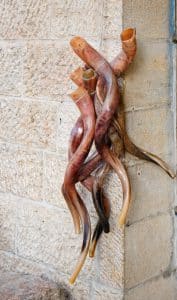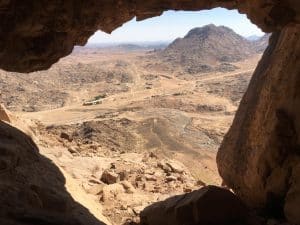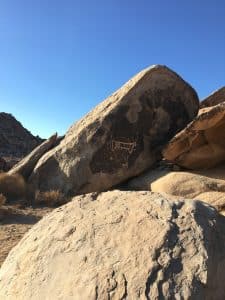The shofar is a trumpet made entirely by God. It’s the horn of a ram or a kudu, and makes a powerful sound when blown—the loud and haunting blast is known as a “teruah”. The shofar comes into its own at the end of the summer and the start of the High Holidays. I don’t know if you’ve ever tried to blow one, but it’s hard! Some people have perfected the skill, but it takes a bit of practice. The Jewish civil calendar begins with a blast of the shofar at the Feast of Trumpets, Yom Teruah, on the first of the month of Tishri.
>> MORE ABOUT JEWISH TRADITIONS FOR THE FEAST OF TRUMPETS
Proclaim a memorial… but for what?
In the chapter which lays out God’s calendar, Leviticus 23, God calls for a solemn assembly on the first day of the seventh month:
“Speak to the people of Israel, saying, In the seventh month, on the first day of the month, you shall observe a day of solemn rest, a memorial proclaimed with blast of trumpets, a holy convocation.” (Leviticus 23:24)

The part that says “a memorial with blast of trumpets” is “zichron teruah” in Hebrew (זִכְרוֹן תְּרוּעָה). A memorial? What are we supposed to be remembering? God doesn’t say much about the Feast of Trumpets, but given that the instruction comes not long after a very major incident involving shofar blasts, it is harking back to the Sinai event. Here’s a reminder about what happened:
The Lord said to Moses, “Go to the people and consecrate them today and tomorrow, and let them wash their garments and be ready for the third day. For on the third day the Lord will come down on Mount Sinai in the sight of all the people. And you shall set limits for the people all around, saying, ‘Take care not to go up into the mountain or touch the edge of it. Whoever touches the mountain shall be put to death. No hand shall touch him, but he shall be stoned or shot; whether beast or man, he shall not live.’ When the trumpet sounds a long blast, they shall come up to the mountain.” ” (Exodus 19:10-13)
The blast, or “teruah” of the shofar was the sign of invitation to the people of Israel: they could approach their God.
On the morning of the third day there were thunders and lightnings and a thick cloud on the mountain and a very loud trumpet blast, so that all the people in the camp trembled. Then Moses brought the people out of the camp to meet God, and they took their stand at the foot of the mountain. Now Mount Sinai was wrapped in smoke because the Lord had descended on it in fire. The smoke of it went up like the smoke of a kiln, and the whole mountain trembled greatly. And as the sound of the trumpet grew louder and louder, Moses spoke, and God answered him in thunder. The Lord came down on Mount Sinai, to the top of the mountain. And the Lord called Moses to the top of the mountain, and Moses went up. (Exodus 19:16-20)
Milestone mountain
Mount Sinai was the peak of high drama. In Jewish thought, it’s an absolutely pivotal event, a major milestone in Israel’s journey with God. Christians tend to look back to the cross when trying to find lost bearings, but it’s Mount Sinai that Jewish people look back to for orientation as a time when God met His people on earth in a powerful way.
 As believers we have the Lord’s supper as a regular reminder of the New Covenant. Jesus said, “Do this in remembrance of me” (Luke 19:22) because He knew we’d need the reminder. For Jewish people the blowing of the shofar is a reminder of the Sinai covenant with God which resembled a wedding covenant in many ways. Joel Richardson points out the multiple similarities between the Sinai covenant and Jewish wedding rituals in his book “Sinai to Zion”: the Ten Commandments are like a “ketubah” or marriage contract. The Shabbat was to be a sign of the covenant to those around, like the sign of a wedding ring. Then there was the cloud over the mountain like the covering of the chuppah or wedding canopy. God made vows His people, and they made vows in response with one accord:
As believers we have the Lord’s supper as a regular reminder of the New Covenant. Jesus said, “Do this in remembrance of me” (Luke 19:22) because He knew we’d need the reminder. For Jewish people the blowing of the shofar is a reminder of the Sinai covenant with God which resembled a wedding covenant in many ways. Joel Richardson points out the multiple similarities between the Sinai covenant and Jewish wedding rituals in his book “Sinai to Zion”: the Ten Commandments are like a “ketubah” or marriage contract. The Shabbat was to be a sign of the covenant to those around, like the sign of a wedding ring. Then there was the cloud over the mountain like the covering of the chuppah or wedding canopy. God made vows His people, and they made vows in response with one accord:
And all the people answered with one voice and said, “All the words that the Lord has spoken we will do.” (Exodus 24:3)
Of course we know with hindsight that Israel did not keep their promises, but God upheld His side. The story of Israel is one of a faithful God who loves His unfaithful people. He expresses His grief about the broken covenant most potently in the book of Hosea:
When the Lord began to speak through Hosea, the Lord said to him, “Go, marry a promiscuous woman and have children with her, for like an adulterous wife this land is guilty of unfaithfulness to the Lord.” Hosea 1:2
But when we think of the way that Elijah fled back to Mount Sinai in the time of his deepest distress, we get a glimpse into the meaning of that mountain for God’s people. After the momentous showdown with the prophets of Baal in 1 Kings 18, and the subsequent death threats from Jezebel, we’re told that Elijah hotfooted it from Mount Carmel in the north all the way down to Beersheva in the desert, and after some angelic sustenance, all the way down to Horev, the Mountain of God. Here’s what happened when he arrived:
There he came to a cave and lodged in it. And behold, the word of the Lord came to him, and he said to him, “What are you doing here, Elijah?”
He said, “I have been very jealous for the Lord, the God of hosts. For the people of Israel have forsaken your covenant, thrown down your altars, and killed your prophets with the sword, and I, even I only, am left, and they seek my life, to take it away.”
And he said, “Go out and stand on the mount before the Lord.”
And behold, the Lord passed by, and a great and strong wind tore the mountains and broke in pieces the rocks before the Lord, but the Lord was not in the wind. And after the wind an earthquake, but the Lord was not in the earthquake. And after the earthquake a fire, but the Lord was not in the fire. And after the fire the sound of a low whisper. (1 Kings 19:9-12)
It was a reminder of the dramatic Sinai event of the past, but in complete contrast to the shofar blasts of Exodus 19, Elijah experiences the intimacy of the still, small voice of the God he loves.
Remember who you are and where you’ve come from
Elijah had just appealed to the twelve tribes of Israel on Mount Carmel, challenging the priests of Baal to a duel: their false gods vs. the God of Israel, first to light the fire wins. After the idolatrous priests failed spectacularly, Elijah prayed this prayer:
“O Lord, God of Abraham, Isaac, and Israel, let it be known this day that you are God in Israel, and that I am your servant, and that I have done all these things at your word. Answer me, O Lord, answer me, that this people may know that you, O Lord, are God, and that you have turned their hearts back.” (1 Kings 18:36-37)
At Sinai, Elijah encountered God. His life was recalibrated. He was reminded of who he was—and most importantly, who God was.
 God asks twice, “What are you doing here, Elijah?” It’s a question to help Elijah reflect on his purpose and identity. He answers the same way twice. He talks about his zeal for God, his sorrow for the people of Israel, his loneliness as a prophet, and the fear for his life. God goes on to give him encouragement, comfort, a reminder that he’s not alone, a new commission and a new companion to do it with. In short, Elijah would say that going back to Sinai to meet God was a good idea. He was refreshed and reset for the next leg of his ministry.
God asks twice, “What are you doing here, Elijah?” It’s a question to help Elijah reflect on his purpose and identity. He answers the same way twice. He talks about his zeal for God, his sorrow for the people of Israel, his loneliness as a prophet, and the fear for his life. God goes on to give him encouragement, comfort, a reminder that he’s not alone, a new commission and a new companion to do it with. In short, Elijah would say that going back to Sinai to meet God was a good idea. He was refreshed and reset for the next leg of his ministry.
Paul’s mountain of revelation
Elijah wasn’t the only biblical hero to return to Sinai for inspiration. In Galatians we read that Paul went to Mount Sinai in Arabia as a new believer, spending three years there in a time of intensive study and revelation. He was there at Horev getting downloads from God.
“I did not immediately consult with anyone; nor did I go up to Jerusalem to those who were apostles before me, but I went away into Arabia, and returned again to Damascus.” (Galatians 1:17)
Now Hagar is Mount Sinai in Arabia; she corresponds to the present Jerusalem, for she is in slavery with her children. But the Jerusalem above is free, and she is our mother. (Galatians 4:25)
During his time at Mount Sinai in Arabia Paul must have been meditating on the meaning of the Sinai covenant in the light of the Messiah’s coming. In Galatians he deals mainly with the matter of law versus freedom in the Spirit. He refers back to Hagar and Sarah, considering them metaphors for Sinai and Jerusalem. Hagar, the Egyptian handmaid, represented the slavery of trying to follow the Law, while Sarah represents the heavenly Jerusalem of freedom.
It’s very fitting that Galatians is so freedom-centric, since the whole Sinai episode was about freedom from slavery.
God rescued His people from slavery in Egypt and delivered them into freedom with Him. He gave them the Law which is essentially a code for how to live as free people.
However, the pharisee of pharisees was beginning to understand a new level of liberty as he embraced his Jewish Messiah, and the new and better covenant (Jeremiah 31:31) in His blood. Sound the trumpet of freedom! The Messiah has set us free from the law of sin and death!
“It is for freedom that Christ has set us free,” writes Paul. “Stand firm, then, and do not let yourselves be burdened again by a yoke of slavery”. (Galatians 5:1)
The shofar and the sound of freedom
So if the sound of the shofar calls us back to Exodus 19, back to Sinai and the covenant with God, we are also forced to face the broken promises that followed. Unlike the unconditional covenants with Noah and Abraham, the covenant at Sinai was conditional on Israel keeping their side of the bargain:
Now therefore, if you will indeed obey my voice and keep my covenant, you shall be my treasured possession among all peoples, for all the earth is mine; and you shall be to me a kingdom of priests and a holy nation.’ (Exodus 19:5-6)
 Israel, for the most part, did not obey God’s voice or keep His covenant. Even as the covenant ceremony was being established on the mountain, God’s people were cavorting with the calf. A sorry sign of what was to come. The broken tablets, and God’s broken heart. Back in Hosea God asks his servant to prophetically name his children after the broken relationship with Israel:
Israel, for the most part, did not obey God’s voice or keep His covenant. Even as the covenant ceremony was being established on the mountain, God’s people were cavorting with the calf. A sorry sign of what was to come. The broken tablets, and God’s broken heart. Back in Hosea God asks his servant to prophetically name his children after the broken relationship with Israel:
Then the Lord said, “Call him Lo-Ammi (which means “not my people”), for you are not my people, and I am not your God.” (Hosea 1:9)
But the Lord is a faithful covenant-keeper. He was not willing to end the relationship there. Long before Sinai, before Egypt, before Abraham and even before the creation of the world God’s plan was to send His Messiah to bring restoration and the new start we would all need. The New Covenant in the blood of the Messiah made relationship with God possible again—not just for Israel, but for all the families of the earth. Now all who accept the atonement for sin paid for by the eternal and spotless Lamb of God, whether Jew and Gentile, are welcome to become the people of God. The way is open for all to become part of His royal priesthood, His holy nation, based on HIS righteousness, not ours. The covenant relationship with Israel remains but now Gentiles are grafted in to become fellow heirs of the promise:
But you are a chosen people, a royal priesthood, a holy nation, God’s special possession, that you may declare the praises of him who called you out of darkness into his wonderful light. Once you were not a people, but now you are the people of God; once you had not received mercy, but now you have received mercy. (1 Peter 2:9-10)
There’s more to come!
 The Feast of Trumpets is often associated with the end of days, and for good reason. As we look back to Sinai, we know that the pattern of the Exodus ripples throughout history and that the ultimate redemption is yet to come. There will be another time that the Lord descends from heaven to the sound of the shofar:
The Feast of Trumpets is often associated with the end of days, and for good reason. As we look back to Sinai, we know that the pattern of the Exodus ripples throughout history and that the ultimate redemption is yet to come. There will be another time that the Lord descends from heaven to the sound of the shofar:
For the Lord himself will descend from heaven with a cry of command, with the voice of an archangel, and with the sound of the trumpet of God. And the dead in Christ will rise first. (1 Thessalonians 4:16)
The sound of the shofar indicates several things in the Bible—the call to assemble, to gather for war, to raise the alarm, for Israel’s appointed times, or for the inauguration of a new king. Isaiah 18:3-7 and 27:13 speak of the shofar announcing the coming King, the Messiah, when He comes to rule and reign at the end of this age. The blast of the shofar calls us to look back in memorial, and eagerly look forward in hope as the trumpet heralds the new Kingdom.
The sound of the shofar reminds us of the Sinai covenant forsaken.
The sound of the shofar reminds us of the unyielding love of our bridegroom, the King.
The sound of the shofar reminds us of God’s supreme victory over sin and death.
The shofar calls to each one of us: Remember your first love. Remember your blood-bought freedom. Get ready for the coming King.
Settle for nothing less than a living relationship with the One who loves you… and set you free!
“My beloved is mine and I am his.” (Song of Songs 2:16)
















